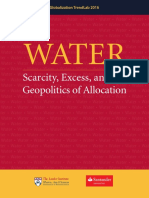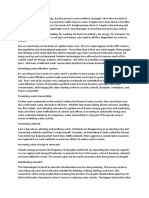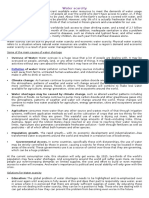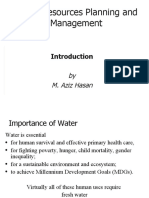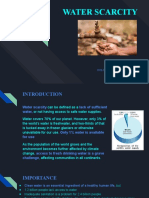Global Water Scarcity and Requirement of Water Desalination
Uploaded by
Lakmali GunasekaraGlobal Water Scarcity and Requirement of Water Desalination
Uploaded by
Lakmali GunasekaraGlobal Water Scarcity and Requirement of Water Desalination
Water, a crucial natural resource, has reportedly seen a rising drop in its availability for meeting
fundamental human and environmental needs over the previous decades, resulting in scarcity.
This puts even more strain on the world's finite freshwater resources, resulting in water stress in
many parts of the world—a scenario that is often regarded as the most important global concern
of the twenty-first century. The continuously increasing global population (especially in
developing countries), industrialization and economic development, and changing consumption
patterns, as well as other external factors such as climate change and migration, are said to be the
major drivers exacerbating the growing challenge of global water scarcity [4,5].
Many people in developing countries are currently experiencing a combination of physical and
economic water scarcity. Overall, the current worldwide water scarcity crisis is apparently
becoming more severe as demand rises over time, particularly in emerging economies, where
agriculture, industry, and urban expansion are stated to be rapidly evolving. According to a
United Nations research [4], worldwide water demand is expected to increase significantly in the
future years across all water use sectors, with the majority of this expansion occurring in
developing nations around the world.
Water is essential for life, because without it, civilizations would cease to exist and the Earth
would be a barren wasteland. Water is regarded as a plentiful natural resource on the planet. 3/4
of the surface is covered in water. However, salty sea water makes for 97 percent of available
water on Earth, with freshwater accounting for barely 3%. Humans and animals are supplied
with a little amount of the available water. [1] Natural fresh water is in short supply in many
countries throughout the world. Because of rising population rates and higher living standards, as
well as the increase of industrial and agricultural operations, more fresh water will be required in
the future. Fresh water supplies from rivers and groundwater are now restricted and are rapidly
depleting in many areas. [2] As a result, water conservation, reuse, rainwater harvesting, storm
water utilization, and desalination are crucial for the future of humanity's water supply.
You might also like
- The Global Water Crisis - Solutions for a Thirsty PlanetFrom EverandThe Global Water Crisis - Solutions for a Thirsty PlanetNo ratings yet
- Global Water Scarcity: Problems and SolutionsNo ratings yetGlobal Water Scarcity: Problems and Solutions7 pages
- 2016 06 03 Water Scarcity Excess and The Geopolitics of Allocation PDFNo ratings yet2016 06 03 Water Scarcity Excess and The Geopolitics of Allocation PDF31 pages
- Access To Safe Water Is An Absolute Necessity For Everyone Around The WorldNo ratings yetAccess To Safe Water Is An Absolute Necessity For Everyone Around The World4 pages
- Thirsty Planet - Confronting The Looming Crisis of Water Scarcity and Environmental DegradationNo ratings yetThirsty Planet - Confronting The Looming Crisis of Water Scarcity and Environmental Degradation48 pages
- Water Resources Planning and Management: by M. Aziz HasanNo ratings yetWater Resources Planning and Management: by M. Aziz Hasan23 pages
- Global Water Crises: By: Walaa Khalil WaganNo ratings yetGlobal Water Crises: By: Walaa Khalil Wagan9 pages
- Environmental Technologies-Water and Wastewater ManagementNo ratings yetEnvironmental Technologies-Water and Wastewater Management4 pages
- The Amount of Usable Water Resources On EarthNo ratings yetThe Amount of Usable Water Resources On Earth50 pages
- Module Introduction To Water Management and Irrigation100% (4)Module Introduction To Water Management and Irrigation11 pages
- Water Management: Future of Water ResourcesNo ratings yetWater Management: Future of Water Resources3 pages
- Solutions For Water Scarcity and ContaminationNo ratings yetSolutions For Water Scarcity and Contamination3 pages





